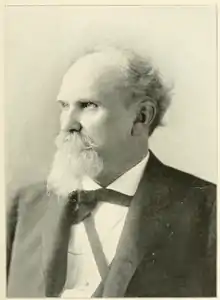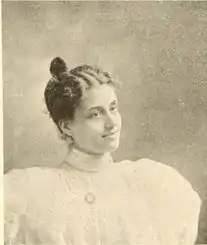James Kimbrough Jones
James Kimbrough Jones (September 29, 1839 – June 1, 1908) was a Confederate Army veteran, plantation owner, lawyer, US Congressional Representative, United States Senator and chairman of the Democratic National Committee from Arkansas.
James Jones | |
|---|---|
 | |
| Chair of the Senate Democratic Caucus | |
| In office December 1899 – March 4, 1903 | |
| Preceded by | David Turpie |
| Succeeded by | Arthur Pue Gorman |
| Chair of the Democratic National Committee | |
| In office 1896–1904 | |
| Preceded by | William F. Harrity |
| Succeeded by | Thomas Taggart |
| United States Senator from Arkansas | |
| In office March 4, 1885 – March 4, 1903 | |
| Preceded by | James D. Walker |
| Succeeded by | James Paul Clarke |
| Member of the U.S. House of Representatives from Arkansas's 2nd district | |
| In office March 4, 1881 – February 19, 1885 | |
| Preceded by | William F. Slemons |
| Succeeded by | Clifton R. Breckinridge |
| Personal details | |
| Born | James Kimbrough Jones September 29, 1839 Marshall County, Mississippi, U.S. |
| Died | June 1, 1908 (aged 68) Washington, D.C., U.S. |
| Political party | Democratic |
| Military service | |
| Allegiance | |
| Branch/service | |
| Rank | Private |
| Unit | 3rd Arkansas Cavalry[1] |
| Battles/wars | American Civil War |
Biography
Born in Marshall County, Mississippi, Jones moved with his father to Dallas County, Arkansas in 1848. He pursued classical studies under a private tutor; he would later study law and was, in 1874, admitted to the bar, practicing in Washington, Arkansas.[2]
During the American Civil War, Jones served in the Confederate Army, and returned to his Arkansas plantation afterward. From 1873 to 1879, he was a member of the Arkansas State Senate, and was president of that body from 1877 to 1879. In 1896 and 1900, he was the chairman of the Democratic National Committee.[2]

Jones was elected as a Democrat to the Forty-seventh and Forty-eighth Congresses (March 4, 1881 – March 3, 1885); he was re-elected to the Forty-ninth but tendered his resignation on February 19, 1885, having been elected to the United States Senate that year. Jones was reelected in 1891 and 1897 and served from March 4, 1885, to March 3, 1903, unsuccessfully seeking reelection in 1902. While in the Senate, he was chairman of the Committee on Indian Affairs (Fifty-third Congress), Committee on Corporations Organized in the District of Columbia (Fifty-fourth and Fifty-fifth Congresses), Committee on Private Land Claims (Fifty-fifth Congress.)[2]
After his Congressional service, Jones resumed the practice of law in Washington, D.C., where he died; he was buried in Rock Creek Cemetery.[3]
References
- "James Kimbrough Jones". Butler Center for Arkansas Studies. Retrieved 28 September 2018.
- "Jones, James Kimbrough". United States Congress. Retrieved 28 September 2018.
- "James Kimbrough Jones". Find A Grave. Retrieved 28 September 2018.
Sources
- United States Congress. "James Kimbrough Jones (id: J000231)". Biographical Directory of the United States Congress. Retrieved on March 24, 2010
| U.S. House of Representatives | ||
|---|---|---|
| Preceded by William F. Slemons |
Member of the U.S. House of Representatives from Arkansas's 2nd congressional district 1881–1885 |
Succeeded by Clifton R. Breckinridge |
| U.S. Senate | ||
| Preceded by James D. Walker |
U.S. Senator (Class 3) from Arkansas 1885–1903 Served alongside: Augustus Garland, James Berry |
Succeeded by James Paul Clarke |
| Preceded by Henry L. Dawes |
Chair of the Senate Indian Affairs Committee 1893–1895 |
Succeeded by Richard F. Pettigrew |
| Preceded by Nelson W. Aldrich |
Chair of the Senate District of Columbia Corporations Committee 1895–1897 |
Succeeded by John W. Daniel |
| Preceded by Isham G. Harris |
Chair of the Senate Private Land Claims Committee 1898–1899 |
Succeeded by Henry M. Teller |
| Party political offices | ||
| Preceded by William F. Harrity |
Chair of the Democratic National Committee 1896–1904 |
Succeeded by Thomas Taggart |
| Preceded by David Turpie |
Chair of the Senate Democratic Caucus 1899–1903 |
Succeeded by Arthur Pue Gorman |

